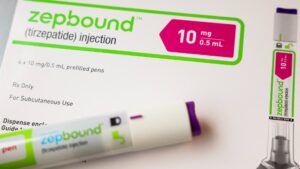Exploring Eli Lilly’s Game-Changing Approach to Zepbound: Access and Affordability in Weight Loss Treatment
In a bold move to enhance access to its much-discussed weight loss drug, Zepbound, Eli Lilly has recently announced significant pricing reductions and new product offerings aimed at making the medication more accessible to patients without insurance coverage—especially those enrolled in Medicare. This shift not only reflects the company’s commitment to addressing a burgeoning need but also raises important questions about the future of obesity treatment and the landscape of pharmaceutical pricing.
The Launch of Single-Dose Vials
As of December 2023, Eli Lilly has rolled out higher doses of Zepbound in single-dose vials—7.5 mg and 10 mg—available for self-pay through its consumer website, LillyDirect. Priced at $499 for the first month and up to $699 for subsequent refills, these new offerings are part of the company’s strategy to respond to soaring demand while ensuring that patients have access to authentic treatments rather than cheaper, potentially unsafe alternatives from compounding pharmacies.
Interestingly, Lilly has also reduced the prices of the lower doses of this medication. The 2.5 mg vial now costs $349, while the 5 mg version is available for $499. This price adjustment underscores Eli Lilly’s attempt to meet the urgent needs of patients who want reliable access to effective weight management solutions.
A Commitment to Accessibility
Patrik Jonsson, president of Eli Lilly’s diabetes and obesity division, expressed a desire to bridge the gap in coverage for patients battling obesity, particularly those enrolled in Medicare or employer-sponsored plans that typically do not cover obesity treatments. “In the absence of full coverage…we are just trying to fill that room and provide a more affordable solution,” Jonsson noted. This statement highlights a critical aspect of healthcare that often goes overlooked—the struggle for equitable access to essential medications.
The Shift Toward Self-Management
Patients using Zepbound now have the responsibility of self-injection using syringes rather than the more user-friendly autoinjector pens, which add to the medication’s cost. However, Eli Lilly argues that by offering these vials, they can boost production capacity and meet increasing demand. Given that the autoinjectors can run as high as $1,000 per month before insurance, this transition could empower patients to take control of their weight loss journey without financial strain.
Throughout initial treatment phases, patients typically start with a lower dosage (2.5 mg) before gradually increasing to maintenance doses. However, it’s important to note that Eli Lilly has not made the higher doses—12.5 mg and 15 mg—available in vial form yet.
Addressing Competition and Quality Concerns
With the recent end to the Zepbound shortage declared by the U.S. Food and Drug Administration (FDA), Eli Lilly is positioning its offerings against cheaper compounded drugs, which some patients have turned to during the supply gap. Jonsson quipped that while they aren’t directly competing on price, the aim is to ensure that patients receive FDA-approved medications known for their safety and efficacy—key factors in any health regimen, particularly for a drug designed for ongoing weight management.
The Market Impact and Future of Zepbound
While Eli Lilly has not disclosed specific sales figures from the new LillyDirect model, Jonsson has indicated that roughly 10% of new patients in the obesity treatment market are starting their journey with Zepbound through this innovative avenue. The intent to provide a more affordable, FDA-approved treatment signifies not just a shift in product availability but a potential shift in health policy that could encourage higher acceptance of such medications in mainstream healthcare settings.
Conclusion: A New Era for Weight Management
Eli Lilly’s move to provide more accessible obesity treatments through lower-priced, single-dose vials of Zepbound reflects an evolving approach to health management. This strategy speaks volumes about the changing landscape of pharmaceutical care, where accessibility and affordability become essential pillars. For patients seeking sustainable weight loss solutions, this could represent a significant step forward in ensuring that medications are both effective and economically viable.
At Extreme Investor Network, we believe that staying informed on such innovative healthcare approaches is vital to making educated decisions about personal health investments. Keep an eye on Eli Lilly and other key players in the obesity treatment market as they navigate these complex challenges—your health might depend on it!

